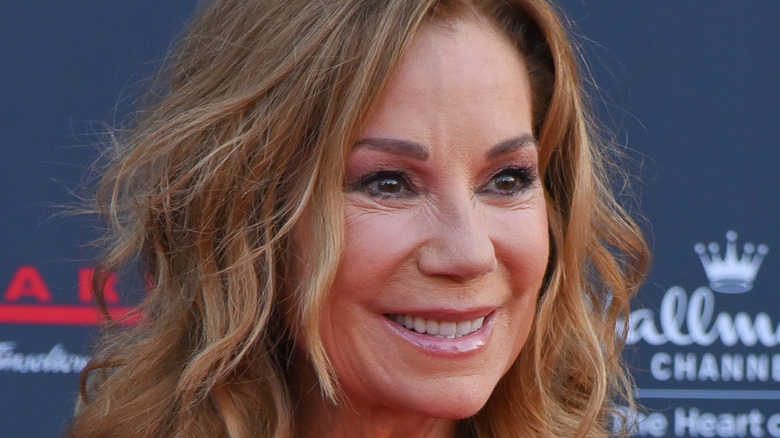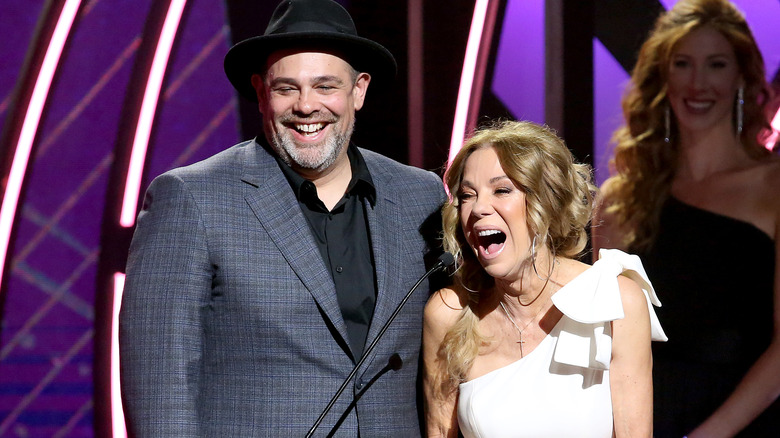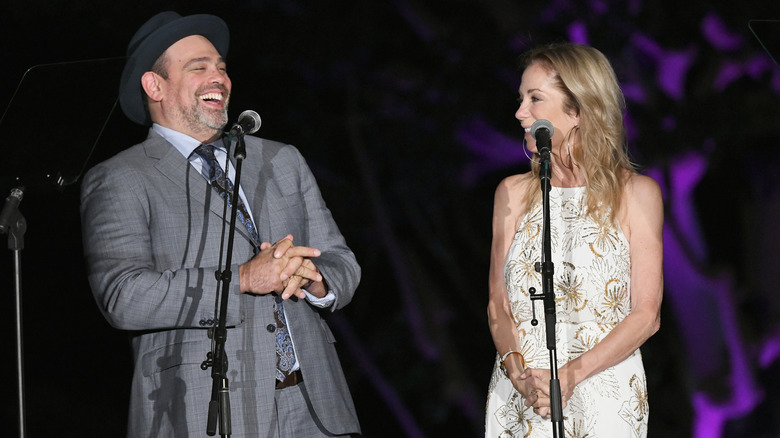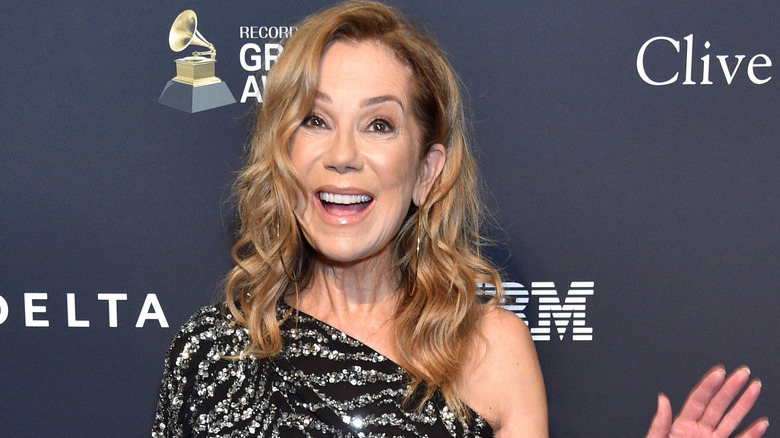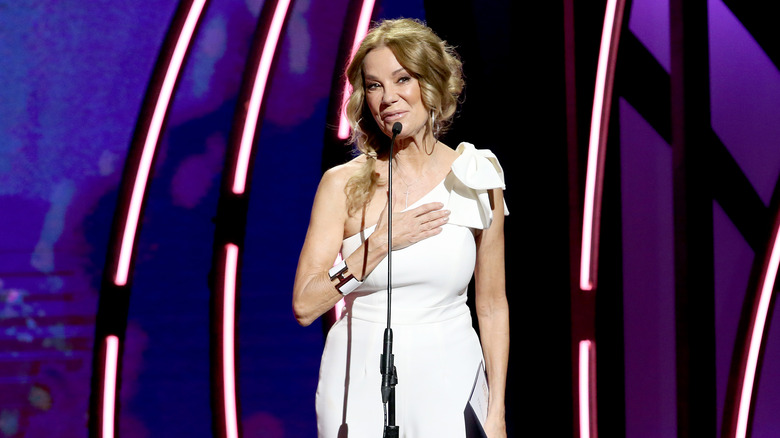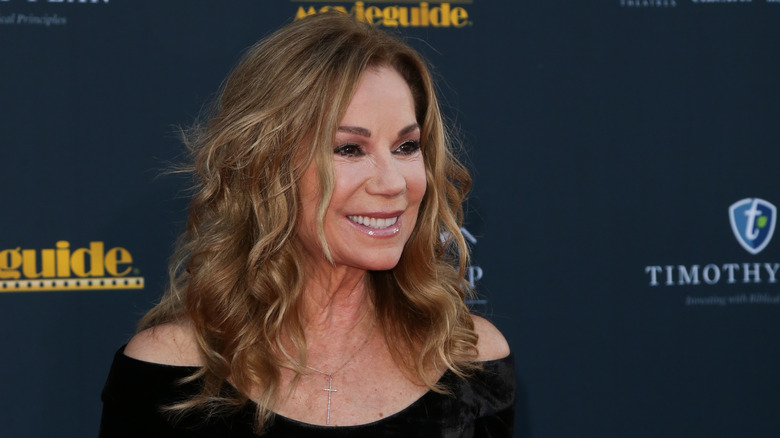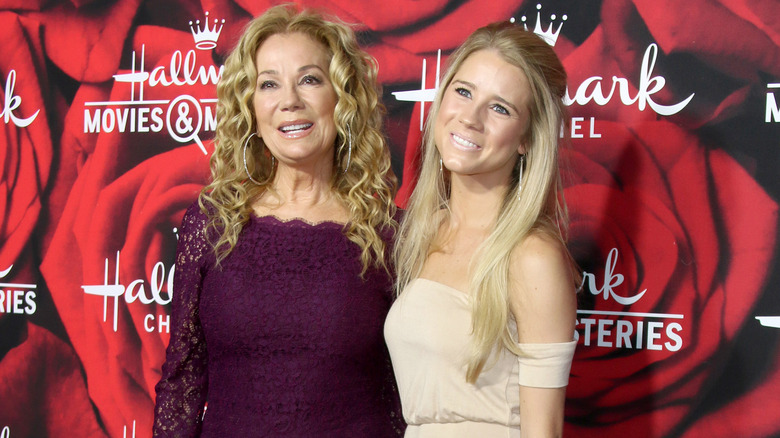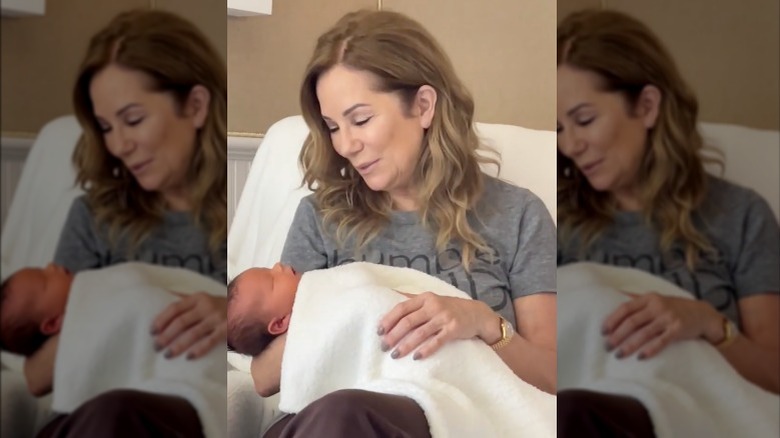Kathie Lee Gifford Show Us The Way And Discusses Faith Journeys - Exclusive Interview
Kathie Lee Gifford and Rabbi Jason Sobel may seem like an odd pair at first. Gifford is a singer-songwriter, actress, author, and TV host best known for her years hosting "TODAY." On the other hand, Sobel is a minister, academic, and Jewish follower of Jesus (Yeshua) with his Rabbinic ordination from the UMJC (Union of Messianic Jewish Congregations). What they have in common is a love for God and exploring history. And because of that, they formed an unlikely but powerful partnership.
They first worked together writing "The Rock, the Road, and the Rabbi: My Journey into the Heart of Scriptural Faith and the Land Where It All Began." The book was an instant New York Times bestseller. Now, the pair have come together again to write their latest book, "The God of the Way," released with a subsequent film, "The Way" (in theaters Aug. 30, featuring Nicole C. Mullen, Danny Gokey, Jimmie Allen, Larry Gatlin, and BeBe Winans). While they may seem like an unlikely duo at first, Gifford's storytelling abilities, combined with Sobel's knowledge of scripture, make them the perfect team to share their message.
Gifford sat down for an exclusive interview with The List to discuss their project. During our discussion, she shared how she and the rabbi met, why she sees sharing God's love as her mission, and her new life as a grandmother.
How Gifford met her writing partner
How did you and Rabbi Jason Sobel first meet and start working together?
I guess we're like the odd couple. We seem like, "Wait a minute. How did she get with him? and [how did] he get with her?" We had a mutual friend, a lovely woman named Leslie Burbage, who used to attend his church ... He was a pastor of a church in Malibu. She knows about my love of Israel, my love of studying the word of God, and my love of rabbinical studies. She said, "You've got to meet Rabbi Jason." I went, "Oh, I don't have time. Whatever."
She said, "Well, he's going to be in New York during the Christmas season," which is my least favorite season in the world in New York because it's all about tinsel and not about the true birth of Jesus or any of that stuff. I was never in a good mood during that time back then. [Burbage] said, "He's going to be there. I'll bring him by the studio." I said, "Okay. I'll take him for a quick lunch."
I take him to lunch. We're sitting there, and he's basically listening to me moan and groan about why I hate Christmas. It's a "bah humbug" moment. I don't hate Christmas. The true essence of Christmas is the birth of Christ. We don't celebrate it in the way that it actually happened, and it frustrates me. It's presents and mess. It's chaos. It's not shalom.
Anyway, he sat there for a long time. Then he looks at me, and he goes, "I can give you a really good reason to like December." I said, "Okay. Good luck with that — not that I believe in luck, but go ahead." He goes, "Jesus was not born in December, but Jesus was conceived in December, during the festival of Hanukkah, the festival of lights."
He went on for about two hours to regale me about the true story of the nativity. It was so in-depth. It was so exciting that it literally changed my mind about Christmas. The real essence of Christmas changed my life because it confirmed rabbinical teaching is the only way to go, because that's how we really get to the heart of things.
Why Rabbi Sobel was the perfect partner
I was writing a book then, called "The Rock, the Road and the Rabbi," about my rabbinical trips. I felt I needed to do that because there's so much biblical illiteracy in the world. People were growing up with bad translations of the Bible and bad myths that were persistent ... I started writing that book, knowing there was a need for people like myself, who had wanted to learn about this stuff.
I realized about 50 pages in that I didn't have a book. I had a pamphlet. My knowledge only went so deep. I called him up, and I said, "I would love you to consider to be prayerful about helping me write this book. You have the knowledge that I don't have. I can get the book to people because they know me and they know my voice, and they trust it, but [for] the knowledge, I need you."
We co-wrote that book. I thought maybe a thousand people would buy it. Well over 700,000 at this point [have bought it]. It's been a huge publishing phenomenon. We're already working on ... not he and I, but [I'm] working on the second book in the series. It's with a different rabbi. I want to write them all with different rabbis because they all have a different perspective.
He and I have written this new book together. It's called "The God of the Way." It's a companion book to a movie that I had written on my own, with collaborators, musical collaborators, over the last four years. That movie is called "The Way" ... People go, "Wait, wait, wait." They don't get that the first thing is the movie. The book is the companion book to teach you to go deeper into, "Who were Abraham and Sarah? Why did it take 40 years?" ... All the whys and where and whens of scripture come to life when you're in the masterful hands, like rabbis.
I did all the lifting on the movie. He did most of the heavy lifting on the book. We're a really good team. We both want the same thing, which is to enlighten people about the word of God and to teach people that there's so much more to learn if they dig deeper and open their mind and heart to it.
Why Gifford started writing about her spirituality
What first pushed you to write about and share your spiritual journey with people?
I was so frustrated when I started studying rabbinically, meaning what the word of God actually really says, in the Greek and Hebrew. I started studying rabbinically. What was Israel like at the time? What was the cultural relativity? What was the geopolitical environment of the day? The Bible doesn't go into all of those things, all the details, which I find are why I love history. I want to know what Cleopatra smelled like, not just her story. Take me there. Fill in the details for me. Studying rabbinically does that.
My faith came to life again. I was a once deeply committed, seeking believer of Jesus and truth. Over the years, I'd gotten bored. I'd gotten lukewarm because nobody was teaching this way. I started to die on the vine. The word of God says, "My people perish for lack of knowledge." If you read the King James version or some of these other terrible versions of translations, you're going to die on the vine because it's not true what they write. It isn't. Everything's fuzzy but not accurate.
If I'm going to base my entire life on something, I want it to be the truth. I started studying it. The more I studied it, the angrier I got. People say, "Wait a minute, you're a Christian." No, it's righteous anger. Why hasn't anybody ever told me this before? That's what everybody tells me now that I write these books and I share this information. They all say the same thing: "Why hasn't anybody ever taught me this before?"
People want to know the truth, now more than ever, because the world is so screwed up, and the world is so topsy-turvy, and it's scary. People are terrified. They want to know truths, that they can build their life on something that's going to last forever, into eternity. So, that's why. I don't love doing it, but I'm called to do it.
Do you feel like writing these books is also making that [knowledge] more approachable for people?
That's right. I'm the waymaker. I'm the messenger. I get it from him, and then I take it to the people. He's become a very good communicator in his own right. He was not as good as he is when I first met him. He can carry his own. He doesn't need me. That's for sure. He's written a couple of other books on his own. They're excellent. One of them is called "The Mysteries of the Messiah," which is so deep that most profoundly intelligent and ... knowledgeable people in the world of biblical studies struggle with it. It's that deep. He's truly a master at it, but I make it more human. I make it more accessible.
The biggest challenges making the film
Were there any ways that you grew, writing the book and [making] the movie, before that?
You grow every time, mostly in your faith. We did this film in Israel, in Texas, right here in Tennessee, and also in Moab, Utah, during COVID. It was shot under really, really rough circumstances during COVID ... that had its own challenges.
I couldn't get any money for the project. All of my money from my "The Rock, the Road, and the Rabbi" book had been spent on "The God Who Sees," my first oratorio. I was out of money, and nobody wanted to give it to me. They didn't see the value in it. "Why are you doing a movie with music and narration?" I said, "That's an ancient art. It's called an oratorio." It's one of the longest forms of storytelling in the world. You tell a story. You narrate a story, but you underlie it. You put it into a bed of music to make it exciting and enriching.
I love bringing these ancient stories to life, in ways that make them totally relevant in today's world. The Bible is not a dead 5,000-year-old book. It's more alive than ever. It's alive unto all the bone and the marrow and the stem cell of us now and more relevant than ever in the world today. All these stories are about real people, things that really did happen. People don't know the stories, and they certainly don't know the power of them. It's thrilling to be able to do that. I'm not finished with that. This will not be my last movie, I don't think.
How she found time to study and write
Lots of people know you as a television host, and you're also a singer, an actress, and an author. How do you have time for everything, especially while you're doing everything else, setting aside time to study and write a book?
I don't know. I ask myself that too. I've been doing it for so long that I don't have a pat answer for it, except that every day is different. When I was going into the studio every single day, I had the back seat of my car, and to and from work, that was always my office. I wrote a couple of books in the back seat of the car, on my legal pad, with my BIC pen. Now, I live in Tennessee, and I don't have to go to the studio anymore. It gives me a lot more free time.
I can make films, [and it] was very difficult to make my films when you're doing a daily TV show, stuck in New York, too. It makes it much more difficult. I feel very freed up now to do the work that I was born to do. It's an exciting time for me, but I also don't waste time.
I've learned as I've gotten older the beauty of being able to say no to things. I have work to do. Anything that basically takes me off point and off my work, unless it's something that the Lord truly leads me to do, I say no.
I've done everything else. I've done it all. I have no ego, and I don't need to win any more awards. I don't need any more Grammy nominations, or Emmy wins, or Oscar mentions. I don't care about any of that stuff. I want people to know that Jesus loves them. Everything I do — I wake up in the morning, I go, "How do I tell people today? How do I tell people that Jesus loves them?" They don't know it yet. If I'm to be the one that's able to tell them, it's a great privilege.
What Gifford wants to focus on next
Do you have any projects that you're excited to focus on next?
I do want to write a few more oratorios. I started two others. One will be "The God of Holiness." The other's called "The God of the Nativity," which is the true story of what happened during the birth of Christ. It's going to be very controversial, which I like to be. People are going to go, "Don't mess with my manger. I like my tinsel at Christmas time. I like my Christmas tree. Don't mess with my manger." I said, "I'm not going to mess with it, but I'm going to tell the truth. You don't have to accept it or believe it, but I need to tell it."
That first story that the rabbi told me when we sat there in the restaurant ... I sat there, absolutely mouth agape, for three hours. He told me this story. I went, "Oh my God." It was so exciting. I can't wait to tell it. That's really it.
I have a new grandson. I want to spend a little more time with him. I want a rich, joyful life, stay healthy, and don't sweat the stupid stuff anymore. It's not necessary ... I feel like that's who I am right now. I'm at the feet of Jesus, and no one can take it from me. There's not a better way. There's not a better place to be than right there, at the feet of Jesus.
Why she loves her life in Tennessee
I still write lots of other songs, songs that are contained as a song, for other artists. A lot of them are being recorded now in other people's lives. That makes me happy. You don't write a song to put it on a shelf. It's a joy when somebody really responds to one of my songs and is like, "May I record it?" I go, "Oh, yes. I'm excited." They're all brilliant singers and performers. That's a kick in the pants. That is so much fun.
That [is] a life I could not have in Greenwich, Connecticut. It was surrounded by hedge funders. They don't knock on your gate, first of all, and say, "Hey, yo. You want to write a song?" Here, people show up [and ask], "Want to write a song?" If I can, I go, "Yeah, come on in." It's a very different lifestyle in Greenwich, Connecticut, believe me. I don't miss that. I miss my home there. I miss my little grandson, but I get back enough to get a taste of it. This is where I'm supposed to be now, in Tennessee, for sure.
Her new role as a grandmother
You mentioned your grandson. What's it been like for you, becoming a grandmother?
He's perfection. When I hold him and I sing to him — either "Amazing Grace" or "Jesus Loves Me" — even as a brand newborn, you could tell he was trying to open his eyes and smile and sing because he came from heaven. It was all familiar.
He was fussy. I said, "Okay, let's do this the old-fashioned way." I've got him in my arms, then I started [to sing]. It was so sweet. That's where we came from, and that's where we're going to end up, in heaven with our Lord and creator, Jehovah Elohim and Jesus. Little babies know that, inherently. He said, "Don't forbid the children to come unto me, for such is the Kingdom of Heaven." When you're holding one of them, or you're looking at them, you realize, "Oh my gosh, there's no truer words that were spoken. They're miracles. They're miracles straight from God." It's a great blessing. He's [over] seven weeks old.
"The God of the Way" is now available in bookstores everywhere. Visit Fathom Events to find a screening of "The Way" near you on September 1.
This interview has been edited for clarity.
